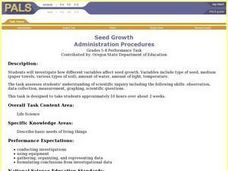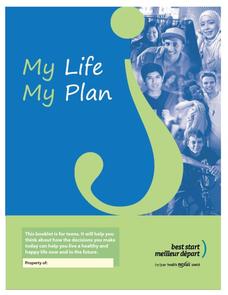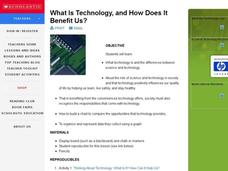Curated OER
A Walk in the Forest
Students explore interrelationships among plants and animals. Students listen to Where to, Little Wombat? by Charles Fuge, and contribute words and phrases for a classroom animal and plant survival chart. Students take a walk in a...
Curated OER
Forests Need People
For this forests and people lesson, 3rd graders brainstorm what forests are used for, discuss forest habitats, and how human interventions have affected trees and animals that depend on the forest environment. Students read the books,...
Curated OER
Living in Extreme Environments: Havens on the Deep Sea Floor
Students identify the characteristics of an extreme environment in the deep ocean and consider what organisms need to survive in these elements. They research sampling and data collection methods in this environment.
Curated OER
Religion and Ethics: Living with Special Needs
Students explore human behavior by exploring mental and physical disabilities. In this learning disability lesson plan, students identify the different disabilities students have which prevent them from working at the same pace as the...
Curated OER
What Makes a Cat a Cat?
Learners investigate the lives of pets by videotaping them. In this animal life lesson, students videotape a cat and other pets using school cameras in a computer lab. Learners review the footage from the cat and other animals and...
Curated OER
Seed Growth
Students develop an independent procedure to investigate the germination of two types of seeds. Students must construct data tables or charts to record observations and results, graph the data, and analyze the data.
Curated OER
Insects A-Z!
Alphabet insects! Who has ever heard of such a thing? Get ready because your class is going to research insects that start with a specific letter of the alphabet. In small groups, they'll use the Internet and reference texts to locate...
Hastings Prince Edward Public Health
My Life My Plan
Being a teenager is harder today than it's ever been. Guide high schoolers through the last few years before adulthood with a resource that encourages them to reflect on their lives and passions, and to make a healthy plan going forward.
New York State Department of Environmental Conservation
Adaptations – Designs for Survival
What's the difference between behavioral adaptations and physical adaptations? Learn about the various ways that organisms adapt to their environment with a worksheet about the creatures of the Hudson River.
Curated OER
Back-to-School Night: What Parents Need to Know
Get prepared for your Back-to-School Night presentation with these tips and ideas.
Virginia Department of Education
DNA Structure, Nucleic Acids, and Proteins
What is in that double helix? Explain intricate concepts with a variety of creative activities in a lesson that incorporates multiple steps to cover DNA structure, nucleic acids, and proteins. Pupils explore the history of DNA structure,...
Curated OER
First Grade, First Grade, What Do You See? (Elementary, Reading/Writing)
First graders assist in making a list of the many things that Brown Bear saw in the story. They create an illustration of the person, place, or thing that they wrote about in their pattern sentence.
Curated OER
Living On The Moon
Students evaluate what life would be like living on the moon or another planet in our solar system. In this science lesson, students create a colony that they would use to live in on the moon using Legos.
Curated OER
Artifact Identification-What is it?
Students observe an artifact and make an inference about the artifact's purpose. They are going to role-play as archaeologists by using artifacts to hypothesize about the lives of past people.
Curated OER
Polar Bear Needs a Home!
Third graders are introduced to the topic of habitat . They create a zoo exhibit fo a polar bear that is being donated to the Albuquerque Zoo. The zoo is not big enough for a brand new cage, so the students choose which of three...
Curated OER
What on Earth?
Second graders investigate the different living and nonliving things they can find on Earth. In this life science lesson, 2nd graders record their observations as they dig into the soil. They examine them under the magnifying glass and...
Curated OER
What is Sand?
Students complete a sand analysis project. In this sand grains lesson, students learn background information on how sand is formed and what sand grains are made of. Students are given bags of sand and use them to complete a worksheet...
Curated OER
What Is Technology, and How Does It Benefit Us?
Young scholars examine and define what technology is as well as the differences between science and technology. They assess the role of science and technology in society, conveniences technology offers and create a chart to compare the...
Curated OER
Who Wants to be a Millionaire? Human Body Systems and Plants
Fifteen multiple choice questions review a variety of biology topics. In game-show fashion, viewers answer questions about a plant's needs, the skeletal system, and the cardiovascular system. If you happen to teach these three topics...
Curated OER
What is Biology?
In this human needs worksheet, students review a graphic organizer explaining the basic human needs. Then students complete 1 true or false and 2 short answer questions.
Curated OER
What does 'Endangered' mean?
Students discuss a variety of teacher led discussion questions about what makes an animal endangered. They take a short field trip to an open area and set a boundary for each child for them to either write or draw about how the location...
Curated OER
Five Kingdoms of Living Things
Fifth graders are introduced to the classification system used in Science. In groups, they explain the characteristics of each of the five kingdoms. After watching a video, they review the life processes of each kingdom and complete a...
Curated OER
Creating Nonviolence: A Theatre of the Oppressed Approach to Things Fall Apart
Eleventh graders analyze Ahimsa and complete activities for nonviolence. For this nonviolence lesson, 11th graders define violence and relate it to their lives. Students adapt prose into a dialogue to act out and analyze the violence in...
Curated OER
Wonderful Worms
Students identify living and non-living things and explain the importance of earthworms to the soil. They name some basic facts about earthworms, recognize basic worm vocabulary words and demonstrate vermicomposting techniques.

























